#everybody staking out their claim. what narratives get set up what will later be changed....
Text
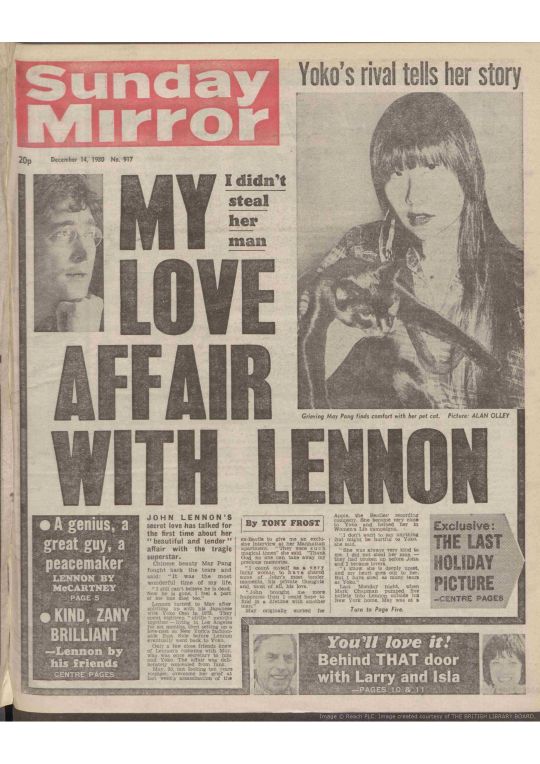
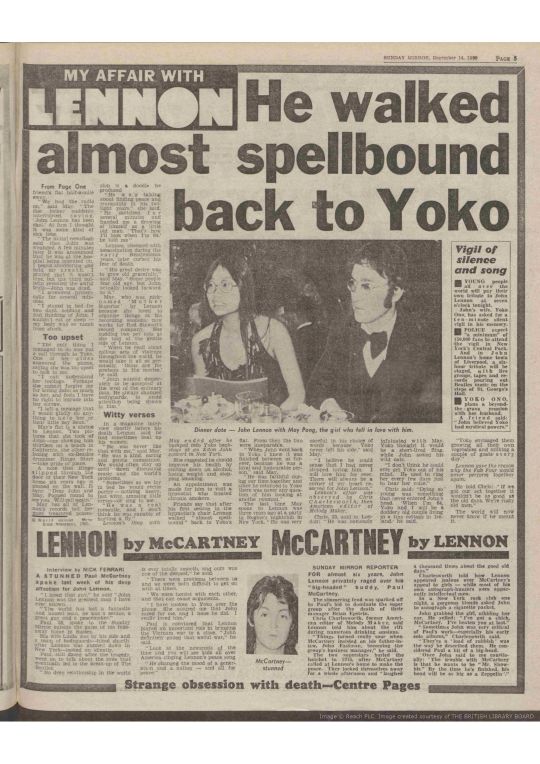
May Pang, Sunday Mirror December 14, 1980
MY LOVE AFFAIR WITH LENNON
- I didn't steal her man - by Tony Frost
John Lennon's secret love has talked for the first time about her "beautiful and tender" affair with the tragic superstar.
Chinese beauty May Pang has fought back the tears and said: "I still can't believe he is dead. Now he is gone, I feel a part of me has died too."
Lennon turned to May after breaking up with his Japanese wife Yoko Ono in 1973. They spent eighteen 'Idyllic' months together - living in Los Angeles for six months, then setting up a love-nest on New York's fashionable East Side, before Lennon eventually went back to Yoko.
Only a few close friends knew of Lennon's romance with May, who was once secretary to him and Yoko. The affair was deliberately concealed from fans.
May, 30 but looking ten years younger, overcame her grief at last week's assassination of the ex-Beatle to give me an exclusive interview at her Manhattan apartment. "They were such magical times", she said. "Thank God, no one can take away my precious memories. I count myself as a very lucky woman to have shared some of John's most tender moments, his private thoughts and, most of all, his love. John brought me more happiness than I could hope to find in a lifetime with another man."
May originally worked for apple, the Beatles recording company. She became very close to Yoko and helped her in women's lib campaigns.
"I don't want to say anything that might be hurtful to Yoko", she said. "She was always very kind to me. I didn't steal her man - they had broken up before John and I became lovers. I know she is deeply upset, and my heart goes out to her. But I have shed as many tears as Yoko."
Last Monday night, when Mark Chapman pumped five bullets into Lennon outside his New York home, May was at a friend's flat half a mile away.
"We had the radio on," said May. "The disc jockey suddenly interrupted saying 'John Lennon has been shot'. At first I thought it was some kind of a sick joke. The initial news flash said that John was wounded. A few minutes later it was announced that he was at the hospital being operated on. I began shuddering and held my breath. I prayed that it wasn't true, but the third bulletin revealed the awful truth - John was dead. I screamed hysterically for several minutes.
I stayed in bed for two days, sobbing and just thinking of John. I couldn't eat or sleep - my body was so numb from shock."
TOO UPSET
"The only thing I managed to do was pull a call through to Yoko. One of her aides answered the phone, saying she was too upset to talk to me. I can understand her feelings. Perhaps she cannot forgive me for loving John as much as her, and I feel I have no right to intrude into her sorrow. I left a message that I would gladly to anything to help her or their little boy Sean."
May's flat is a shrine to Lennon. Two pictures that she took of John - one showing him shirtless on a beach in California, the other relaxing with ex-Beatles drummer Ringo Starr - take pride of place.
A note that Ringo slipped through the door of their New York home is pinned on the wall. "Dear John and May, Popped round to see you. Will call again."
May has all of Lennon'd records but her most treasured possession is a doodle he produced.
"He was talking about finding peace and tranquility in his twilight years," she said. "He sketched for several minutes and handed me a drawing of himself as a little old man. 'That's how I'll look, when I'm 64,' he told me."
Lennon obsessed with assassination during the early Beatlemania years, later curbed his fear of death.
"His great desire was to grow old gracefully," said May. "Some people fear old age, but John actually looked forward to it."
May, who was nicknamed 'Mother superior' by Lennon because she loved to organise things at his recording sessions, now works for Rod Stewart's record company. She cuddled two pet cats as she told of the gentle side of Lennon.
"When he read about callous acts of violence throughout the world, he would take it all so personally. 'Guns are for cowboys in the movies,' he said. John wanted desperately to be accepted at the level of the ordinary man. He always shunned bodyguards, to avoid attention being drawn to him."
WITTY VERSES
In a magazine interview shortly before his death Lennon said he had sometimes beat up his women.
"He was never like that with me," said May. "He was a kind, caring and gentle companion. We would often stay up until dawn discussing music and the world's problems. Sometimes as we lay in bed he would recite poetry - nothing heavy just little witty, amusing verses - or sing to me. He was a real romantic and I don't believe he was capable of hurting a fly."
Lennon's fling with May ended after he bumped into Yoko backstage at an Elton John concert in New York.
She suggested he should improve his health by cutting down on alcohol, losing weight and stopping smoking. An appointment was made for him to visit a hypnotist who treated heavy smokers. Friends say that after his first session in the hypnotist's chair Lennon walked "almost spell-bound" back to Yoko's flat. From then the two were inseperable.
"When John went back to Yoko I knew it was finished between us forever, because he was a loyal and honorable person", said May.
He was faithful during our time together and since he returned to Yoko there was never any question of him looking at another woman."
The last time May spoke to Lennon was three years ago ata party at Regine's nightclub in New York. "He was very careful in his choice of words because Yoko never left his side," said May.
"I believe he could sense that I had never stopped loving him. I will love him forever. There will always be a corner of my heart reserved for John Lennon.
Lennon's affair was observed by Chris Charlesworth, then American editor of Melody Maker.
Chris, 33, said in London: "He was obviously infatuated with May. Yoko thought it would be a short-lived fling while John sowed his wild oats.
I don't think he could ever get Yoko out of his mind. He used to ring her every few days just to hear her voice."
Chris said: "Dying so young was something that never entered John's head. 'When I'm 64, Yoko and I will be a doddery old couple living in a tiny cottage in Ireland,' he said. "Yoko envisaged them growing all their own vegetable and milking a couple of goats every day."
Lennon gave the reason why the fab four could never perform together again.
He told Chris: "If we got our act together it wouldn't be as good as the old days. We're rusty old men."
The world will now never know if he meant it.
#going through articles from the first year (in this case days) after john's death is so fascinating#everybody staking out their claim. what narratives get set up what will later be changed....#May Pang#John Lennon
45 notes
·
View notes
Text
The Eternal Problem: A Meditation on Mortality in Sherlock S4

When asked about S4 during the promotional lead-up, Moftiss repeatedly said this new series would be about one thing: consequences. Now that we stand on the other side of S4, what do we think they meant? It obviously wasn't legal consequences for shooting Magnussen, or physical consequences of overdosing on drugs.
In this meta, I argue that TAB and S4 are above all about the moral, metaphysical, and narrative consequences of Sherlock faking his death during the Reichenbach Fall—an act which continues to reverberate through the story two series later, both for the characters and, significantly, for the writers.
Reichenbach Revisited
First, a little review session: What exactly was the "final problem"?
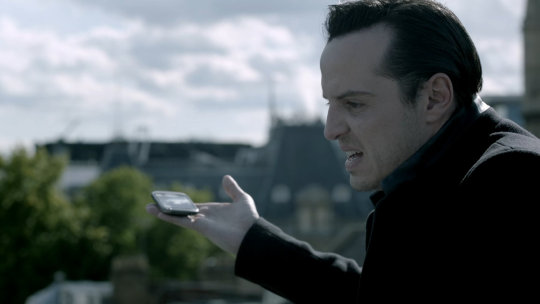
Ah. Here we are at last—you and me, Sherlock, and our problem—the final problem. Stayin’ alive! It’s so boring, isn’t it? It’s just ... staying.
We got an answer, but it was hard to grasp without a larger context. How is staying alive a problem? It is only in the context of Series 4 that the full meaning and extent of Moriarty's final problem starts to become apparent.
Moriarty was sick of staying alive, and he wanted Sherlock to feel the same way. It wasn't enough for Moriarty merely to kill Sherlock (which he could have done at any point on that rooftop)—he needed Sherlock to welcome death, just as he did.
Moriarty tried to give Sherlock the perfect motivation and opportunity to kill himself. He went to great pains to threaten Sherlock's best friends, so Sherlock could honorably sacrifice himself for their safety. Moriarty even stepped first into the breach, hopeful that Sherlock would follow him. But Sherlock refused his offer, and wiggled his way out of this pre-ordained death. He survived the fall and persisted in staying alive.
Appointment in Samarra

When does the path we walk on lock around our feet? When does the road become a river with only one destination?
The sinister story of The Appointment in Samarra is introduced early in Series 4, and referenced repeatedly in the first episode. Some found this heavy-handed, but it was vital to underline the significance of this fable, because this is the heart of our story -- not just The Six Thatchers, not just Series 4, but the entirety of Sherlock since The Reichenbach Fall.
What happens when someone misses their appointment with Death? Does Death show up at some other moment to claim what it is owed? Or does it pass them by completely?
When Sherlock returns from his faked death, he seems to be at least considering the latter possibility.
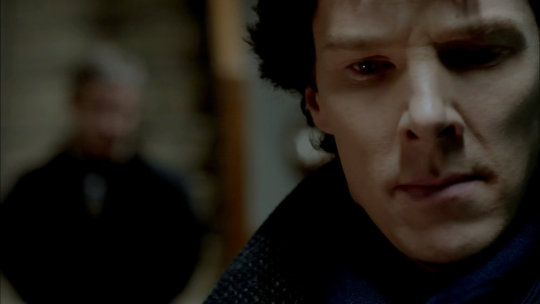
You know my methods, John. I am known to be indestructible.
As time passes, Sherlock appears to be testing his hypothesis by actively courting death. Mary threatens to shoot him if he steps forward, and he does. He accepts Mycroft's promise of a "certain death" assignment in lieu of a prison sentence. He overdoses on the plane in TAB, enough to potentially kill him.
It is during this drug-fueled fantasy that Sherlock starts to wonder why Moriarty was drawn to kill himself, and he himself flirts briefly with the temptations of death.
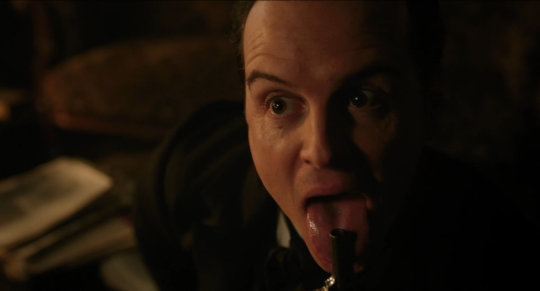
Dead is the new sexy.
But in the end, Sherlock doesn't die.
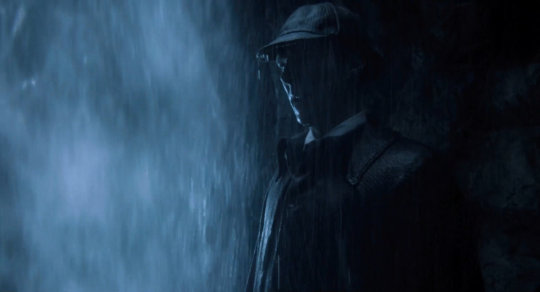
Between you and me, John, I always survive a fall.
He can fall and fall and fall, and he will never land.
Arthur Conan Doyle and the Fandom Problem
The meta-story about Sherlock Holmes's death and rebirth is so often repeated that it has taken on the quality of myth: Doyle hated Sherlock Holmes, he was sick of writing him, so he decided to kill him off once and for all. He even titled his story The Final Problem, for good measure.
We all know what happened next: the fans, to put it mildly, objected. The stories of people dressing in mourning clothes over a fictional character's death may well be apocryphal, but they are nevertheless an important part of how we understand Sherlock Holmes. The fans wouldn't let him die, so Doyle was forced to bring him back from the dead.
Doyle never tried to kill Holmes again, and when he died, other writers took on the project, and in the past hundred years, Sherlock has never stopped being revived.
"There can be no grave for Sherlock Holmes," Vincent Starrett tells us in that famous quotation. It's meant to be reassuring, heart-warming even, but looked at a certain way, it takes on the aura of a threat.
The Final Problem
This, then, becomes The Final Problem, both for Sherlock and for Moftiss. How do you end Sherlock? How do you make him mortal again? Now we see how right Moriarty was: the problem is, in merely "staying alive", Sherlock Holmes becomes inert, stagnant, boring. We don't need him to die, but the audience needs to feel at least that he can die, or all the tension and drama go out of the narrative.
As S4 opens, Sherlock has now walked away from three certain-death situations, and he's a bit giddy.

I’m just glad to be alive!!!
But even as Sherlock is gleefully tweeting and solving crimes and petting dogs, living life to the fullest, there's a pall over the episode. He doesn't quite trust his good luck—surely Samarra can't be avoided forever. So when will it catch up to him?
At last, it seems like it's going to.

But Mary gets in the way, sacrificing herself to save Sherlock, and thus perhaps fulfilling her own missed appointment.
At this point, Sherlock starts to realize the downsides to his invulnerability: it only protects him, not those he loves. Nothing he did could protect Mary, because she was destined to die before him.
Premonition and Predestination
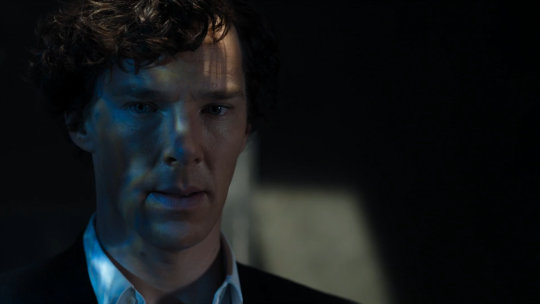
What we call premonition is just movement of the web. If you could attenuate to every strand of quivering data, the future would be entirely calculable, as inevitable as mathematics.
As TST highlights, Appointment in Samarra isn't just about death, it's also about destiny. According to the story, no matter how far you run, you're always exactly where you were meant to be.
Series 4 takes up the idea of predestination repeatedly. In TST, Sherlock appears to be having premonitions—a dalliance with the supernatural almost unheard of in the entire Sherlock Holmes mythos. Sherlock claims to Mary that, given enough information, he can even predict the roll of a dice. This thread is taken up again in The Lying Detective, in which Sherlock is suddenly able to predict (with plausibility-defying accuracy) exactly where everyone will be and what they will do at any given moment.

Really? I correctly anticipated the responses of people I know well to scenarios I devised? Can’t everyone do that?
This preoccupation with predestination serves the narrative, while simultaneously serving as a commentary on the narrative itself. Predestination is a handy metaphor for what it feels like to rewrite someone else's story. BBC Sherlock is fanfic, and in theory it can go wherever it wants, make any changes the writers desire. But even as they make the story their own, we know there are some things Moftiss won't change: the Big Plot Points from ACD they feel obligated to respect. So yes, in a very literal sense, it was predetermined over a hundred years ago that Mary had to die.
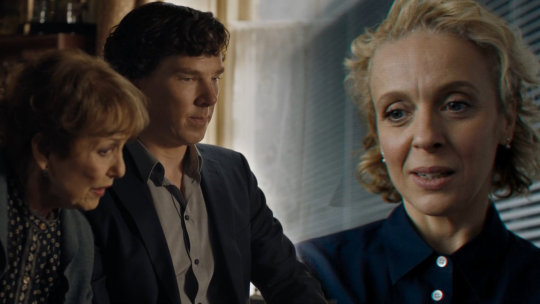
Nothing’s certain; nothing’s written.
But Mary is wrong—her death was indeed written before, and so it had to be written again. Nothing Sherlock did was going to change that. He doesn't need to attenuate to a zillion strands of data, he only needs to follow one to its inevitable conclusion: the narrative. The path that has locked around his feet. Watson in TAB says he always knows when he's in a story; Sherlock is starting to notice the signs as well.
If this is the case, nothing Sherlock does can seriously put his own life at risk. He's the hero, so the narrative will always protect him. But while at the beginning of S4, this idea seemed to thrill him, in TLD he has become much more ambivalent. He cautions "Faith" against suicide, but he also thinks admiringly about Mary sacrificing herself to save him. He goes on a life-threatening drug binge, but doesn't take the idea of his death seriously, despite Molly's chiding. He tells Smith that he doesn't want to die, but he does want Smith to kill him. It's not that he wants to die—he wants to be mortal.

“Taking your own life.” Interesting expression. Taking it from who? Oh, once it’s over, it’s not you who’ll miss it. Your own death is something that happens to everybody else. Your life is not your own.
This is an anti-suicide speech, but in this context it's also kind of a lament. Sherlock does not own his life. Nor do Moftiss. Nor even does Doyle. The fans do—he can only die at their behest, and they will never let that happen.
Meanwhile, Moftiss are expressing the same anxieties about the fate of the narrative. If Sherlock can't die, how do you build to a satisfying, meaningful ending? The show can't go on forever, but its narrative can't be killed, either. The twists get twistier, the cliff-hangers ever more dramatic, the stakes grow higher and higher, but how can any of it ever be resolved?
Samarra, Revisited
The Final Problem is their answer to this question. In interviews since the airing, Moftiss have claimed the key word for the episode was "transgression": TFP goes out of its way to break all the rules of Sherlock. There are no loving shots of London, no text messages floating on the screen. 221b gets blown up, and the rest of the episode takes place in a very blank, artificial, alien environment—more like a stage set than the lived-in world we've come to know. There's no case, no client. Even the Belstaff is missing for much of the episode.
As a result, many fans thought that with TFP, the show had finally gone off the rails—that somehow the writers forgot how to write an episode of Sherlock. But this shift in aesthetic and narrative mode was entirely by design. The writers were deliberately upending everything we know and love about Sherlock in an attempt to convince us that anything was possible, that anyone might die. Even Mycroft. Maybe even Sherlock.
And so, it is in this context that Sherlock makes one last attempt to find Samarra.

As is only appropriate, it is Moriarty who (from beyond the grave) once again suggests this option.

And here we are, at the end of the line. Holmes killing Holmes. This is where I get off.
Up until this point, it seems like Sherlock is planning to kill Mycroft, but here he changes course. It's probably not the locomotive double-entendres that spark his epiphany, so it must be the line "Holmes killing Holmes." Eurus tells us that Jim Moriarty thought Sherlock would make this choice, meaning kill Mycroft. But that doesn't really make sense. When he was alive, Jim never said anything about wanting Sherlock to kill his brother. What Moriarty always wanted was for Sherlock to kill himself.
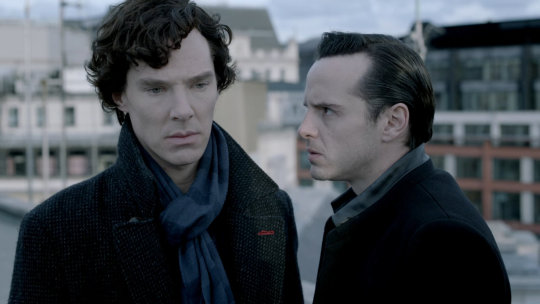
Of course. That’s the point of this.
Suddenly Sherlock realizes that Moriarty's original plan for him is the only way out of his current situation.
And so he "remembers the Governor", who did the one thing Sherlock couldn't do: he killed himself to save someone he loves. Never mind that it doesn't work—that was his appointment in Samarra, and in doing it he atoned for his earlier misdeeds and became a good man. Sherlock missed his appointment, but thanks to Moriarty's hints, he realizes he has a chance to do it over, make it right this time. He must fulfill his destiny and sacrifice himself to save his friends.
Except he can't. It's what Moriarty wanted, his final gift to Sherlock, the solution to their "problem". But Eurus/the narrative/the fans won't let it happen, and Sherlock is saved once again.
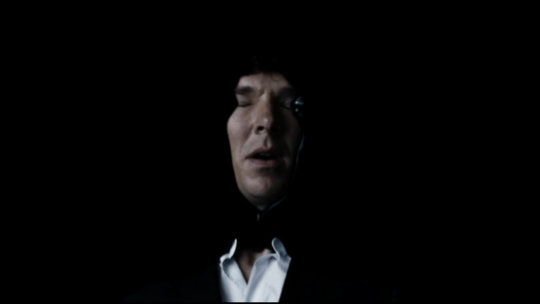
The Eternal Problem
And so the Final Problem remains unsolved, as it always will. The episode wraps up with a kind of coda—not so much an ending as a promise/threat of endless repetition. Again and again, we see Sherlock walk the path to his sister's cell. The flat at 221b Baker Street, which was so dramatically exploded earlier in the episode, is recreated with finicky, almost neurotic precision.
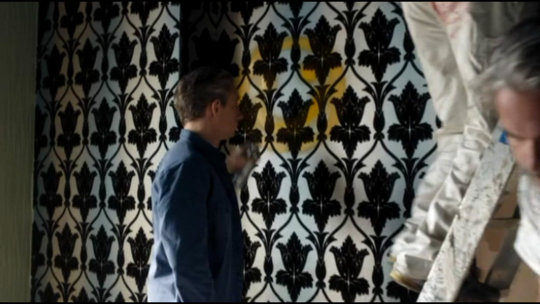
And a montage accompanied by Mary's voice-over reassures us that all our favorite characters will continue on ad infinitum. The idea is comforting and horrifying all at once.
Fans have made much of Lestrade's full-circle assertion that Sherlock is now a "good man", and Moffat has confirmed that the point of the show was to humanize Sherlock.
But this isn't really accurate. From the very first episode, Sherlock was always a deeply human character—that is to say, he was flawed. He was complex. He did good things for bad reasons, and bad things for good reasons. He tried and failed. He was vulnerable and sensitive. He was vain and petty and occasionally cruel, but he was also at times unfathomably kind and empathetic. He inspired loathing in some, but great loyalty and devotion in those who knew him best. He was playful, funny, unpredictable. If he hadn't been all those things—if he had truly been a cold, emotionless machine—he would have been a horrible bore to watch.
The progress of Sherlock Holmes, then, is not from great man to good man, but from a man—a mortal man with weaknesses and flaws—to a mythic hero who is perfectly strong, perfectly wise, perfectly compassionate.
Who you really are, it doesn’t matter. It’s all about the legend, the stories, the adventures. When all else fails, there are two men sitting arguing in a scruffy flat, like they’ve always been there and they always will.
Sherlock Holmes will go on forever, in fanfic and pastiche, in other adaptations, and maybe even under Moftiss's pen. This is how the story is ended, how the "final" problem is solved. Not by killing Sherlock, but by at last submitting to his true, unalterable destiny: Sherlock is fated (or doomed?) to spend all eternity "in a romantic chamber of the heart: in a nostalgic country of the mind: where it is always 1895."
1K notes
·
View notes